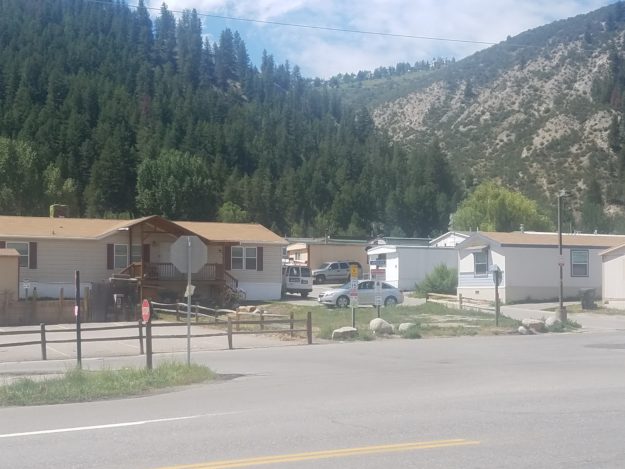Widgetized Section
Go to Admin » Appearance » Widgets » and move Gabfire Widget: Social into that MastheadOverlay zone
Eagle River Village water deemed undrinkable by numerous residents

I recently spoke to a woman who lives in the Eagle River Village mobile home park in Edwards who told me she gets a rash-like skin condition from bathing in the well water there, but when she visits family in Mexico the skin condition clears up.
There’s a certain irony there for travelers from the States to Mexico who often wonder if the water is safe south of the border. In this case, it’s apparently safer than the water system at a vital housing complex in the heart of the Vail Valley – home to Vail and Beaver Creek ski areas.

The park that houses an estimated 2,000 people – or about 7 percent of the overall Eagle River Valley population – has a notoriously dicey well-water system that delivers tap water residents say looks, smells and tastes bad.
Numerous residents, speaking on the condition of anonymity out of fear of retaliation from park ownership and management, told me the water is undrinkable. These folks make up a big and critical segment of the Eagle County workforce, and yet the drinking water is better in Mexico.
“We obviously can’t drink it,” the woman said of the ERV trailer park water. “I’m actually allergic to it, which is really weird, so when I come to Mexico, I obviously bathe there and I have like this stuff on my skin, and it kind of goes away when I’m [in Mexico]. Then I go back [to Edwards] and just start bathing with that water and [the rash] comes back.”
For more on the water situation at the Eagle River Village mobile home park, read the following version of an article I wrote for the Vail Daily that published on July 6. A second part in what will be an ongoing series on water quality will run in the Vail Daily on Monday, July 8.
‘The water is not drinkable’
Residents of Eagle River Village say tap water tastes, smells, looks bad
One of the most populous neighborhoods in one of the wealthiest counties in Colorado — the Eagle River Village mobile home park – has some of the state’s dirtiest drinking water, according to numerous current and former residents of the park in Edwards.
More than a half dozen residents, speaking to the Vail Daily on the condition of anonymity out of fear of retaliation by park ownership, said their tap water is undrinkable because it looks, tastes and smells bad. They buy expensive bottled water for drinking, cooking and bathing.
“The water is not drinkable; it’s dirty, not only in color but also in odor,” one woman said. “I don’t use the water even to cook, and I spend a lot of money on the five-gallon bottles of water. It’s not only the money, but I’m also using a lot of plastic.”
There are 381 mobile homes in the park along both sides of U.S. Highway 6 at the west end of Edwards, and it’s estimated that more than 2,000 people currently call it home. Eagle River Village is its own water provider – utilizing a well system dating back to the 1980s.
“The water is definitely not drinkable, and it has a lot of sediment in it,” another woman said. “After you shower, you can see the sediment left behind. A woman that I know had to sell her trailer because her daughter would get these blisters whenever she would bathe her in the water.”
Nearly 90 percent of Eagle River Village residents own their own trailers but pay land lease rates, or rents, of up to $1,300 a month for a doublewide lot on the land owned by Ascentia Real Estate Holding Company in Littleton, Colo. Rents have steadily climbed from around $350 in the late 1990s to more than $700 a month in 2004 – and are now nearly double that 15 years later.
“One time, I bought a filter that cost me around $1,000, $1,500, and it only had the green light on for like a week and then it turned red, which means that the filter already doesn’t work, and I already had to change it,” one man said. “I would guess that I now spend around $36-$40 per month on [bottled] water.”
According to a 2017 survey of 243 households in the park, conducted by the American Red Cross, the Vail Valley Salvation Army, Our Community Foundation, Americorps and others, “No potable water” was listed as the top concern for residents of Eagle River Village.
Meets minimum safe standards
While acknowledging minor administrative violations in 2016 and 2018 and an elevated lead level finding as recently as 2014 that has since been resolved, state officials say the water in Eagle River Village meets minimum safety standards per the federal Safe Drinking Water Act.
That doesn’t mean there isn’t an “aesthetic” issue with the water at the park, according to Ron Falco, safe drinking water program manager for the Colorado Department of Public Health and Environment.
“The most likely scenario is that there would be some kind of either a mineral content or sediment or something like that,” Falco said. “We know and understand well that there can be water that is safe in terms of the legal standards … but that folks don’t want to drink it because of taste or smell and odor, and that’s a problem.”
Since the 2014 elevated lead reading, which never rose to the level of an actual state violation, Falco said lead levels in the park’s water system have been very low and within acceptable norms. But again, if people are not consuming the water, Falco acknowledges that’s a problem – just not one that the state has the regulatory authority to deal with.
“It’s a problem because people then might not hydrate sufficiently,” Falco said. “They might make other choices like drinking sugary soft drinks, or they might have to spend extra money to purchase bottled water to drink or cook with.
“So while we don’t have that same kind of regulatory oversight on those aesthetic issues with drinking water, we do know that that’s a problem and we do work with water systems to try to provide assistance so that they can better meet their customer needs,” Falco added.
Falco said the state will reach out to Ascentia again and offer assistance from its “drinking water coaches” who travel the state trying to improve the quality of small water systems.
‘Potential changes to the system’
“While the water quality at Eagle River Village is clean, safe and meets all legal standards, we are currently exploring potential changes to the system that would enhance the aesthetic nature of the water,” said Marko Vukovich, vice president of asset management for Ascentia. “In the meantime, we are pleased to provide the best housing value in the valley to the working families of Eagle County.”
CDPHE spokeswoman MaryAnn Nason said the state has previously offered to help improve the system at Eagle River Village.
“We definitely … want to provide this coaching assistance and to be available to support, but one thing is we really have to be invited and the systems have to be open to working with us to provide this coaching, and the county, too,” Nason said.
Vukovich said he did not know about the coaching services offered by the state.
“I am unaware of ‘system coaches’ provided by the state,” Vukovich said. “However, we are open to and welcome input from any resources that may be helpful. We will continue to work with our engineers to explore system maintenance and improvement options that may be considered in the future.”
Outgoing Eagle County Public Health & Environment Director Chris Lindley, who’s taking over at Eagle Valley Behavioral Health on July 9, said the county is very open to getting the water at the park up to higher standards. He noted that if there are five or more people to a trailer in Eagle River Village, that’s approximately 7 percent of the overall Eagle River Valley population.
“Regardless of if the water meets minimum national standards for safety, if it doesn’t smell right and doesn’t look right, that’s not appropriate for our community,” Lindley said. “From the county side, and this is for any community – not just this mobile-home community – we don’t want our residents, when it’s already hard to live here financially, to be spending any discretionary income on basic water to do basic things like showering and cooking ….”
The 2017 survey also found there are 2.52 children per mobile home in the park — or at least 762 — which is 7 percent of the total population of children under the age of 16 in Eagle County. Residents say there’s a sense of helplessness at the park.
“As a former resident, I saw that I had no rights [living there], that my voice would never be heard – not only by the management but I was feeling that nobody would do anything for Eagle River Village,” one woman said, adding that until fairly recently officials were unaware of the water problems.
“I believe officials were unaware of the whole issue because most of the residents of Eagle River Village are Hispanic – some of the people are undocumented – and they don’t like to talk,” the woman said.
“When the residents speak up, they usually get kicked out every kind of way. You get targeted by the management if they see you as a threat or if they see you’re a leader of the community,” she added. “They want you out. People are scared.”
Editor’s note: This is the first in an ongoing series of articles on water-quality issues in Eagle County. Monday: Why a deal to connect Eagle River Village to the Upper Eagle Regional Water Authority system recently fell through.
David O. Williams
Latest posts by David O. Williams (see all)
- First ever Habitat for Humanity homes craned into Vail as ski town tries to tackle acute housing crisis - July 9, 2025
- ‘Now we have to look at that’, Colorado AG Weiser says of challenging Trump’s energy emergency - July 8, 2025
- Neguse, Bennet call for halt to BLM emergency rule aimed at increasing Utah oil-train traffic - June 23, 2025


